Hindu Cremation Rituals UK: Guide & Services
May 23, 2025
Losing a loved one is hard. The rituals we do to say goodbye are very important. In the UK, Hindu cremation rituals help us understand the journey after life that Hinduism teaches. These ceremonies are full of tradition and meaning. They make sure the person who has died is honoured. Their move to the next life is met with respect and love. This guide talks about the beautiful practices of Hindu cremation in Britain. It shows us the deep spiritual meaning and culture in these sacred moments.
Key Takeaways
- Hindu cremation rituals in the UK are deeply rooted in tradition and spiritual beliefs.
- These practices are centred around the concepts of reincarnation and karma.
- Understanding these rituals helps us appreciate the cultural and spiritual richness they bring to Britain.
- Cremation services in Britain honour the deceased and ensure their respectful transition to the next life.
- This guide aims to provide a comprehensive overview of these sacred ceremonies.
Understanding Hindu Cremation Rituals
Hindu funeral customs are full of important rituals. These are not just for show. They are key to Hindu beliefs about life, death, and coming back to life. Central is the belief in Atman, the soul that lives forever.
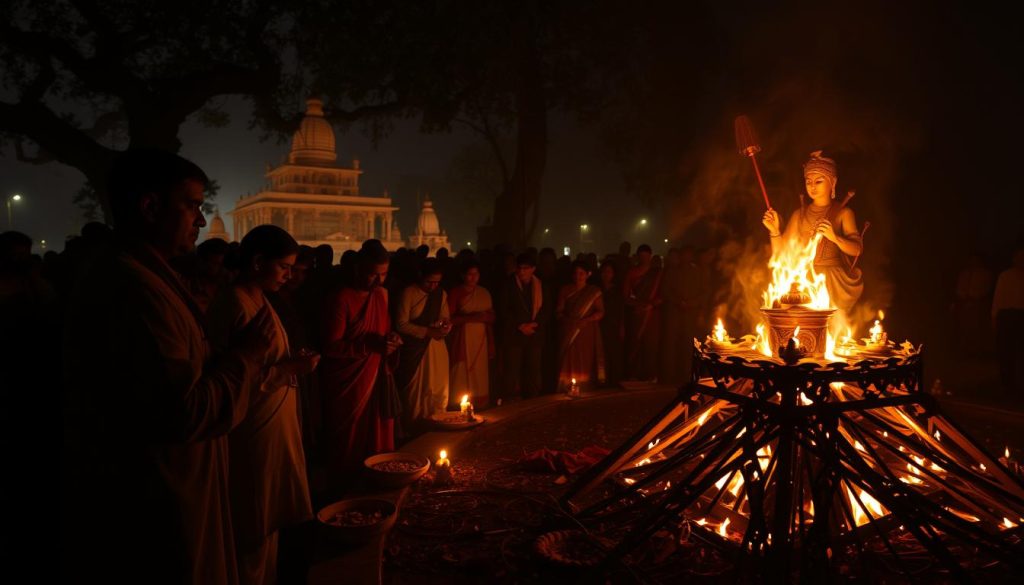
Importance of Cremation in Hinduism
Cremation is very important in Hinduism. It helps the soul leave the body and start its next life. This act helps the soul move on in its journey of coming back to life.
Key Beliefs Surrounding Death
Hindus believe death is more than leaving this world. How you act in life shapes your next life, thanks to karma. Cremation is a key step, affected by how good or bad someone has been.
The Role of Fire in the Ritual
Fire is very important in Hindu funerals. It stands for being pure and watches over the rituals. It leads the soul, helping it find its way to freedom. This shows the deep meaning of cremation in Hindu beliefs.
Preparations for Hindu Cremation
Getting ready for a Hindu cremation in the UK is very important. It shows respect for the one who has passed away. The steps ensure the ceremony is done right.
Selecting a Suitable Location
First, we choose the right place, usually a crematorium that fits Hindu customs. It's key to find a spot that respects and allows these important rituals.
Gathering Essential Materials
Next, we collect important items like ghee, honey, and sacred herbs. These things help make the body pure for the cremation in the UK. They follow Hindu traditions closely.
Preparing the Body for Cremation
Getting the body ready is done with great care and respect. It is washed and dressed in special clothes. This step is crucial in Hindu funerals in the UK, showing deep respect for the soul leaving us.
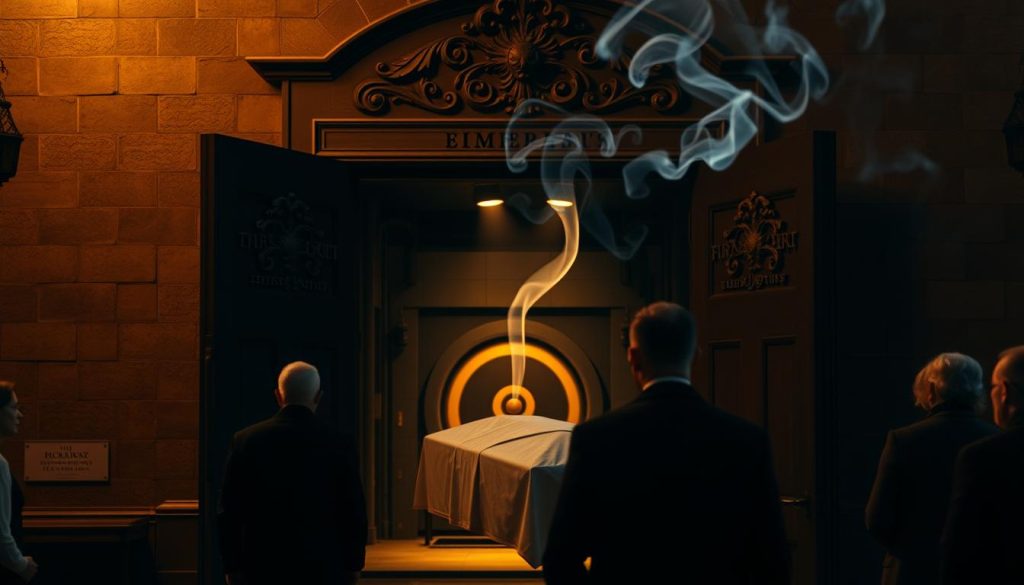
The Cremation Ceremony: Step-by-Step
The Hindu cremation ceremony in London is very spiritual. It follows important steps. This journey respects tradition and the soul's move to peace.
Prayers and Hymns
In London, Hindu cremation ceremonies include prayers and hymns. They are meant to bless the departed. Family and friends gather, reciting sacred words. This creates a respectful space to honor the soul.
The hymns' sounds comfort the sad and help guide the soul. It's a very special part of the ceremony.
The Ritual of Mukhagni
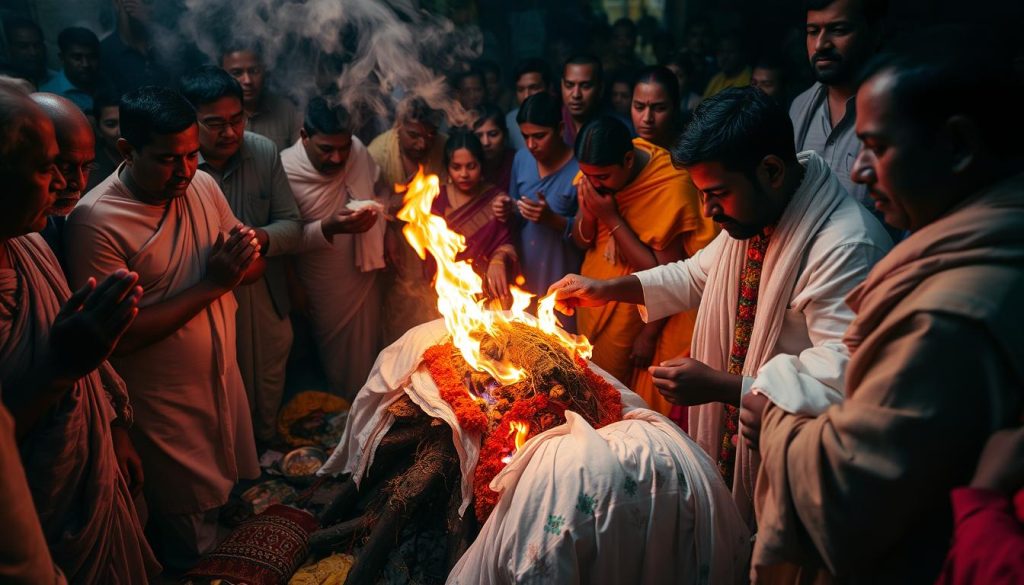
The Mukhagni ritual is a key moment. Often, the eldest son lights the funeral pyre. This act helps cut ties to the earth and frees the soul. It is a deep goodbye.
Post-Cremation Rituals
After the fire, several rituals help the soul and family. Collecting ashes is one step. Then, these ashes are put in a sacred river. It's a way to believe in life after death.
These steps are very important. They help the soul and comfort the family. Knowing this helps us honor the dead and helps those sad find peace.
Timing and Scheduling of Cremation
When planning a Hindu funeral, it's important to think about when the cremation happens. The right timing is key in traditional Hindu funeral customs. It usually happens within a day after someone passes away. This respects the soul's journey onward.
Importance of Timing in Hindu Customs
Timing matters a lot in Hindu funeral timing. People believe the soul starts its next journey right after death. So, the cremation needs to happen quickly. Doing this fast shows respect for the person who died. It also keeps old spiritual traditions alive.
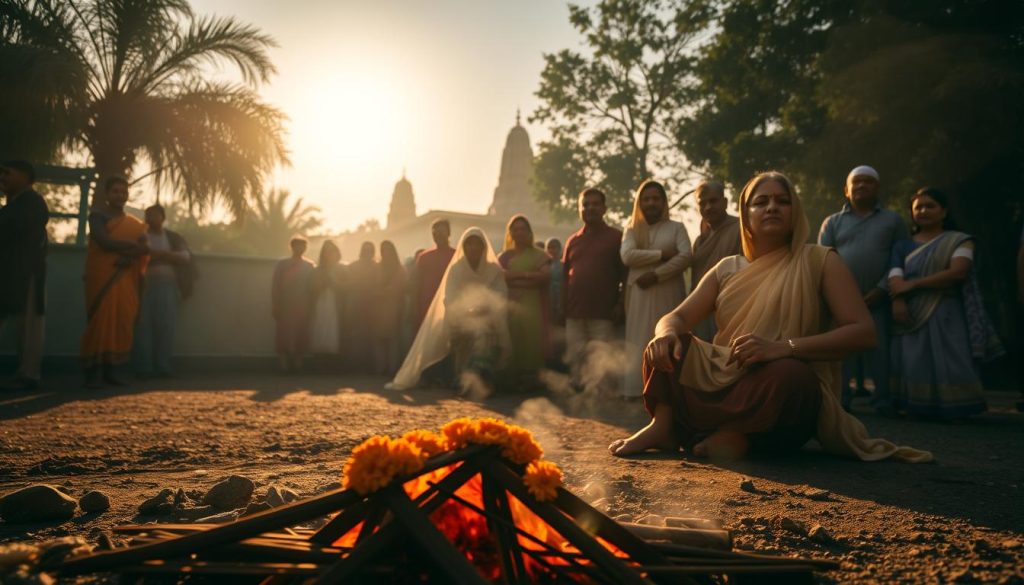
Factors Influencing Cremation Scheduling
Even though quick cremation is advised, some things can change the timing. First, we must think about when crematoriums are open, especially in the UK. Also, family must come together. Some may need to travel far. This must be done with respect to traditional Hindu funeral customs.
Getting these aspects right means the funeral respects the culture but also fits today's world. So, knowing about Hindu funeral timing is important. It helps make the ceremony smooth and respectful.
Legal Requirements for Cremation in the UK
Understanding UK cremation laws for Hindu funerals is key. This guide helps make the process respectful and lawful. Follow these steps for a smooth journey.
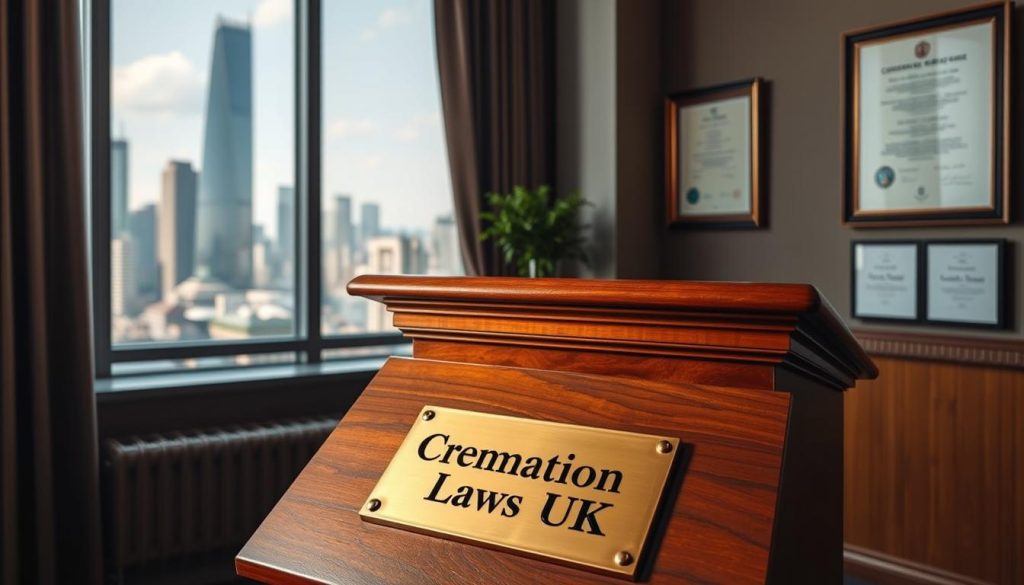
Registration of Death
The first step is to register the death in the UK. This should be done within five days. You will need a medical certificate that states the cause of death. Always follow the local rules to avoid delays.
Necessary Documentation
Gathering the right documents is crucial. You need a cremation authorisation form, known as Cremation 1 form. Make sure the death is registered properly. You also need the Application for Cremation (Form 4). Plus, the body must be moved according to public health rules.
Understanding Burial and Cremation Laws
Knowing both burial and cremation rules in the UK is important. For Hindu funerals, follow local health laws. This includes getting a cremation permit from a local registrar. Such permits make sure the cremation is respectful and legal.
| Requirement | Details |
|---|---|
| Death Registration | Must be done within 5 days, requires a medical certificate. |
| Documentation | Cremation 1 form, Application for Cremation (Form 4), and a permit from the local registrar. |
| Laws | Comply with local health and public safety regulations. |
Finding Hindu Cremation Services in the UK
Looking for Hindu cremation services in the UK means finding experts in Hindu traditions. They know all about the special ceremonies and practices. They guide families, making sure their traditions are respected.
Funeral Directors Specialising in Hindu Practices
Funeral directors know how to meet Hindu families' needs. They understand all the customs. This includes cleaning the body and using special oils. In the UK, they work closely with families. They make sure the funeral follows traditional practices.
Evaluating Cremation Facilities
It's important to check if cremation places respect Hindu rituals. They should allow sacred rituals with special woods. The place must also let families scatter ashes in holy waters. Groups like the Hindu Forum of Britain offer good advice on where to go.
Cost Considerations
Knowing the costs of Hindu cremation is important. Prices change based on what you need, like special funeral directors. It's key to talk to professionals to know these costs. Grief support services help with money and feelings during this time.
Cultural Variations in Hindu Cremation Practices
Hindu cremation practices show lots of cultural differences. This is especially true in the various regions of India. These traditions reflect the unique culture and heritage of each place.
Regional Differences Across India
In different states, cremation customs vary a lot. For instance, in Kerala, people wash the body with sandalwood paste. They also use water from sacred rivers like the Ganges. But in Bengal, there's a strong focus on chanting hymns and mantras during the ceremony.
In places like Tamil Nadu, visits to temples and offerings to gods are common. These actions blend religious meaning with community involvement. Such variations show the diverse spiritual landscape and add to India's rich cultural tapestry.
Adaptations in the UK
Adjusting Hindu rituals for the UK involves mixing old traditions with new ways. This is due to different laws and facilities in the UK. Some changes are needed to respect the deceased while following these laws.
In the UK, certain crematoriums are set up for Hindu customs. Local Hindu communities work with funeral directors familiar with these practices. They make sure rituals keep their meaning in the UK. This mix respects spiritual values and offers a dignified goodbye to loved ones.
| Region | Key Rituals |
|---|---|
| Kerala | Washing with sandalwood paste, use of holy river water. |
| West Bengal | Intense recital of hymns and mantras. |
| Tamil Nadu | Temple visits and offerings. |
| UK Adaptations | Compliance with local laws, adapted rituals at designated crematoriums. |
Bringing cultural rituals into a new country shows how traditions can survive change. As communities grow, their ways of expressing faith and remembering adapt. They link old customs with new ways of life.
After-Cremation Rituals and Traditions
In Hindu culture, after-cremation rituals are very important. They honour the dead and help their soul move on. These rituals give closure and keep the spirit alive. The Hindu Antyesti rites, ash immersion, and the Shradh ceremony UK show deep respect for life.
Antyesti (Last Rites)
Antyesti means 'last rites'. It's a set of holy rituals done after cremation. These help the soul reach the afterlife in peace. Families pray and offer hymns, helping the soul ascend.
The Significance of Ash Immersion
After cremation, ashes go into sacred rivers. This act is very meaningful in Hinduism. It shows that we return to nature. In the UK, people use local waters to keep this tradition.
Annual Remembrance and Shradh
The Shradh ceremony UK happens every year. Families honour their lost ones together. They do rituals, offer food, and make donations in their name. It's a way to remember ancestors and get their blessings.
Hindu after-cremation rituals keep families spiritually connected. They bring comfort and healing in sad times.
Grief and Mourning in Hindu Culture
Grieving in Hindu culture is very special and together. Hindu mourning lets families join with faith and friends. This helps them handle a loss with kindness and respect.
Understanding the Mourning Period
The mourning time in Hinduism starts right after the cremation. The first 13 days are for rituals and prayer. Close family and community help guide the soul to peace.
In this time, families don't join happy activities. They do daily rituals, feed priests, and read holy texts. It helps the soul find peace and enters the afterlife.
Support Systems for Grieving Families
In the UK, support for grieving families is important as more Hindus live here. Temples and community centres help families feel better. They offer support in many ways, making grief easier to bear.
Community support is key in Hindu mourning. It helps families follow their faith while dealing with loss. Volunteers often help with everyday needs. They give comfort and friendship in tough times.
Many UK organisations help with Hindu grief. They offer resources, counselling, and support groups. These services help families connect and find strength in faith and traditions. They remind families they're not alone in sadness.
Resources for Further Information on Hindu Cremation
Looking to learn more about Hindu cremation? Many resources can help you. They offer readings, contacts, and online groups. These can give you the knowledge and support you need.
Recommended Books and Articles
There are great books and articles about Hindu cremation. Authors like A.L. Basham and K V Singh have insightful works. Journals like the "Journal of Hindu Studies" are useful too.
Contact Information for Hindu Communities
Contacting local Hindu community centres can help. Groups like the Hindu Council UK offer support. They help you find experienced priests for cremation practices.
Online Support Groups and Forums
Online groups and forums are very helpful. The Hindu Forum of Britain offers advice and support. Online bereavement groups provide a place to share and find comfort.
FAQ
What is the importance of cremation in Hinduism?
What are the key beliefs surrounding death in Hinduism?
What role does fire play in the Hindu cremation ritual?
How do you select a suitable location for a Hindu cremation in the UK?
What materials are necessary for preparing the body for a Hindu cremation?
What are the steps involved in the Hindu cremation ceremony?
Why is timing critical for Hindu cremations?
What are the legal requirements for Hindu cremation in the UK?
How can we find Hindu cremation services in the UK?
How do Hindu cremation practices vary across different regions of India?
What are the key after-cremation rituals in Hinduism?
How is grief handled in Hindu culture?
Where can one find further information on Hindu cremation rituals?
Providing generations of care, with tradition trust and guidance
Locations We Cover
Aldridge | Bilston |Birmingham | Blackheath | Bloxwich | Brierley Hill | Brownhills | Coseley | Coventry | Darlaston | Dudley | Halesowen | Kingswinford | Oldbury | Rowley Regis | Royal Sutton Coldfield | Sedgley | Smethwick | Solihull | Stourbridge | Sutton Coldfield | Tipton | Walsall | Wednesbury | West Bromwich | Willenhall | Wolverhampton
17 Liskeard Road
Park hall
West Midlands
WS5 3EY
01922 438503

